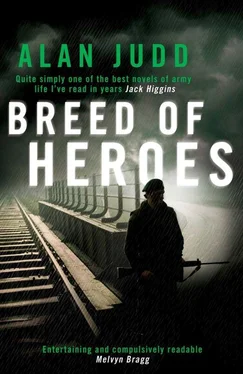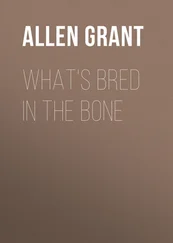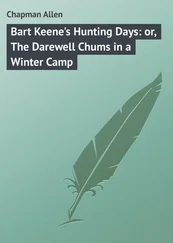‘Christ. It’s not that far, is it? Have we got to put up with this all night?’
‘That’s to Belfast. We’ll be in Liverpool in a couple of hours.’
‘Thank God for that. I was going to say, all night’s a bit long, even for British Snail.’
The door of their compartment was opened abruptly by the Intelligence Section colour sergeant, a well-known criminal named Fox. He grinned at Edward. ‘O Group, sir. Orders Group. CO’s carriage. Ten minutes ago.’
Edward’s mouth dropped open. ‘What for? What’s he want to hold an O Group now for?’
‘Search me, sir. Probably going to brief you on what to do if the boat’s torpedoed. Russian subs in the Irish Sea. Could be nasty.’ Colour Sergeant Fox slid the door to with a crash.
Edward started up and nearly fell in the swaying carriage. Mention of the CO never failed to arouse a degree of panic in him. ‘O Groups even on the bloody train — would you believe it? God only knows what it’s going to be like when we get there. Where’s my file? Has anyone seen my clip file?’ He cast about desperately, his face red, as it always was in a crisis. Crises arose frequently in Edward’s life. His file was found for him. ‘Gas mask,’ he said. ‘Respirator, I mean. Must take it with me. You know what the CO’s like. He’ll probably let off the CS canister to test us.’
‘You’re not serious,’ said Charles.
‘’Course I’m serious. Standing Operational Procedures, paragraph 4b — “In vehicles respirators are to be available at all times.” A train is a vehicle.’ He found his respirator. ‘I’d advise you all to find yours.’
‘But we’re not going to the O Group. And we’re still in England.’
‘For Christ’s sake, Thoroughgood, stop being irrelevant. Just find your respirator and have it available.’ Edward straightened his beret in the mirror and clambered over their kit to the door. ‘Which way’s the CO’s carriage?’ he asked.
‘Left,’ said Tim.
‘Was it left?’ asked John, when Edward had gone.
‘Haven’t a clue.’
The three of them rummaged slowly through their kit for their respirators. Charles couldn’t find his. He had never learned to travel lightly and seemed to have as much kit as the other two together. He gave up and tried to read. The night before he had said goodbye to Janet, his girlfriend, and memories of the uncomfortable evening kept coming back in snippets. There had been nothing positively unpleasant. It was just that he could not think of it without a sense of hopelessness, in much the same way as he felt about the ensuing four months in Northern Ireland. This was due not to any pessimistic appreciation of the situation there, nor to any dislike for the place, which he had never seen, any more than the previous night’s hopelessness had been anything specifically to do with Janet. It was a more general malaise in which he was the only common factor, though he was inclined to blame the CO.
‘Don’t get killed, please,’ Janet had said. They were in a restaurant in Fulham, and she had said it whilst sipping her mock-turtle soup, peering earnestly at him over the spoon.
‘No, of course not,’ he said, feeling absurdly British.
She lowered her spoon. ‘Really, Charles, I’m very worried.’
‘So am I.’
‘It’s worse in a way, staying behind.’
‘I’m sure it isn’t.’
‘Don’t be so selfish.’ She looked down, apparently occupied in making patterns in the soup. With her forehead bent towards him and her gaze averted she always seemed at her most vulnerable, and Charles felt inclined to be tender. But it was a distant sort of tenderness and it could not survive in conversation. She looked up again. ‘I still don’t understand why you joined the Army.’
This had been a bone of contention for some months now. He suspected that what exasperated her most was not the weakness of any explanations he might have given but the fact that he had never really given any. He didn’t know why for certain, though he was dimly aware of various promptings — a feeling he ought to do something different, uncharacteristic, a desire to shock his friends, a not-to-be-acknowledged desire to please his father, an insufficiency of cowboys and Indians during childhood, a surfeit of his subject, history, and the simple feeling that he ought to do something. Janet had become an enthusiastic social worker for Wandsworth Council. He knew that his obvious lack of concern for the difference between her profession — caring — and his — killing — annoyed her. She thought that he thought lightly of hers.
‘You will write, won’t you?’ she said.
‘Yes.’
‘It must be awful, all that killing and suffering. I couldn’t bear it. I’d have to do something.’
‘It’s the living conditions that worry me.’
‘I know. All those dreadful slums.’
‘Ours, I mean. There’s no possibility of privacy. We have to sleep in school boiler rooms, factories, police stations and warehouses.’
‘But you get paid extra for it, don’t you? Hard lying money or something. And lots of people have done it before, so it won’t seem so bad.’
‘It will.’
‘It’s your own fault for joining.’
‘I know.’
‘Well, don’t be unreasonable on our last night.’
They went back to her flat, and thence to bed. Their love-making lacked both affection and passion. The thought that this was probably their last time for four months added nothing to the occasion. Charles had wondered whether he would be subjected to an oblique and tentative interrogation of his feelings for her afterwards, but she fell asleep immediately. He left in darkness early the following morning. If nothing else, the hour and the cold precluded any attempt at an emotional farewell, and they parted silently with a tasteless kiss. He wondered vaguely whether she would sleep with anyone else whilst he was away. There was very little chance that he would.
The journey back to Aldershot on the early train was one of the most depressing experiences he knew. The bleak suburbs slid past like a bad dream repeated. They seemed to emphasise the unreality of his life in the Army, which he had at first mistaken for an unpleasant form of reality. But the Yorkshire exercise had convinced him that his world was not a real one. Seven days and seven nights on the moors, digging trenches, then living in them, then filling them in, then digging more and living in them, and so on. Seven days and nights of rain, during which they had the first recorded case of trench-foot in the British Army for years. This was a condition, well known during the First World War, in which a kind of crust formed on the foot after it had been deprived of air and immersed in soggy socks and boots for days and nights on end. In very bad cases toes were lost. The envied victim, a private in A company, was sent to hospital. The CO urged everyone to think how much worse it would have been on the Somme.
During the first few hours of the exercise, kit became waterlogged and never thereafter had the chance to dry. The imaginary but ubiquitous enemy — to Charles, an obvious personification of the CO’s paranoia — was more troublesome than a real one could ever be. After the first two days everyone was too depressed and wet to speak except to pass on orders and their subsequent amendments and contradictions. During the middle of one day — recognisably so because of a barely-perceptible lightening at the base of the clouds — Charles and his platoon came to a stone bridge over a swollen stream. The downpour continued. They were about to cross the bridge when Charles was aware of a surging in the water and the CO and his wireless operator emerged from beneath the bridge. They had been standing up to the tops of their thighs in the stream.
Читать дальше












